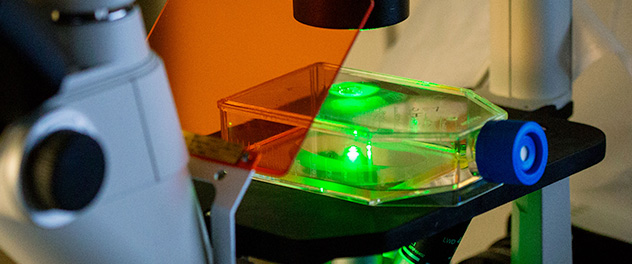-

Tracking breast cancer clues
The Mayo Mammography Health Study uses mammogram images from thousands of women to find clues that can help clarify risk of breast cancer. A unique aspect of our study is that information about risk factors is collected before women develop breast cancer, helping us learn more about early detection of breast cancer, cancer risk and response to treatment.
Overview
The Mayo Mammography Health Study at Mayo Clinic is a breast cancer research study whose goal is to identify features on mammograms that can be used to help detect women at high risk of breast cancer. Findings from the mammography study could ultimately lead to new methods of prevention and treatment of breast cancer.
As part of the Mayo Mammography Health Study, our research team:
- Reviews mammogram images to find clues that will help clarify a woman's future risk of breast cancer
- Studies how certain treatments, such as hormone therapy, may cause changes seen on a mammogram, which could be important for determining how beneficial a treatment will be over the long term
Through this study, we're learning more about early detection of breast cancer, breast cancer risk and response to treatment.
Gathering the mammography data
To accomplish our objectives, our research team is studying the records of more than 25,000 women who agreed to participate in the breast cancer study. Participants enrolled in the mammography study after having a screening mammogram at Mayo Clinic between 2003 and 2006.
The Mayo Mammography Health Study collected questionnaires, mammograms, blood samples and clinical results from the participants. We continue to perform ongoing follow-up of these women to collect any new cancer information, even though we're not enrolling new participants.
Putting the mammography data to work
Enrolling this large group of women and following them over time to track any development of cancer helps us and our collaborators identify risk factors associated with breast cancer and learn more about early detection of breast cancer, breast cancer prevention and the effectiveness of breast cancer treatments.
A unique aspect of our study is that information about possible risk factors is collected before women develop breast cancer. This allows us to find markers on the mammogram or in the blood that will be important to women years before they might develop cancer.
Doctors and researchers may use information from our study to:
- Identify the risk level of patients years before they might develop cancer, which could allow women to make changes to reduce their risks
- Facilitate decisions about the frequency and type of future breast cancer screening strategies
About Dr. Vachon
The Mayo Mammography Health Study is directed by Celine M. Vachon, Ph.D., a professor of epidemiology at Mayo Clinic College of Medicine and Science in Rochester, Minnesota. Dr. Vachon is also chair of the Division of Epidemiology at Mayo Clinic.
Dr. Vachon focuses on two main areas of research:
- The genetics and epidemiology of mammographic density and their utility as risk factors for and surrogate markers of breast cancer risk and recurrence
- The genetic epidemiology of multiple myeloma, its precursor — monoclonal gammopathy of undetermined significance (MGUS) — and other hematologic malignancies